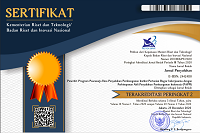Dukungan Kelembagaan Masyarakat dalam Pembelajaran Petani untuk Pengelolaan Hutan Rakyat Lestari di Kab. Gunung Kidul, Provinsi Daerah Istimewa Yogyakarta dan Kab. Wonogiri, Provinsi Jawa Tengah
Abstract
Forest Management is facing the challenge of implementing the sustainable forest management which includes private forest. Successfully gained the Ecolabel Certificate, some private forest management units in Central Java and Yogyakarta’s districts prove that the small units run by farmers are able to implement the sustainable forest management. The farmers’ success in implementing the sustainable forest management must have been gained through learning process. How the learning process was and what local institutions influencing the farmers’ learning process of the sustainable private forest management were, were the research questions of this study. The study used explanatory survey method on 200 farmers in Gunung Kidul and Wonogiri. Data collection was conducted from December 2009 to February 2010. The data were analyzed by using descriptive technique and Structural Equations Model (SEM). The conclusions are : (1) informal local institutions have stronger influence in farmers’ learning than formal institution;(2) local institution aspects : norm, objection of organisation, leadership are potential aspects in influencing farmers’ learning intensity; (3) farmers’ learning intensity can be improved by strengthening informal local institutions and improving farmers’ capacities in organisation management.
Keywords: Sustainable private forest management, private forest, farmers’ learning process, local institutions, social capital
Downloads
Authors who publish with this journal agree to the following terms:
- Authors retain copyright and grant the journal right of first publication with the work simultaneously licensed under a

This work is licensed under a Creative Commons Attribution 4.0 International License that allows others to share the work with an acknowledgement of the work's authorship and initial publication in this journal. - Authors are able to enter into separate, additional contractual arrangements for the non-exclusive distribution of the journal's published version of the work (e.g., post it to an institutional repository or publish it in a book), with an acknowledgement of its initial publication in this journal.
- Authors are permitted and encouraged to post their work online (e.g., in institutional repositories or on their website) prior to and during the submission process, as it can lead to productive exchanges, as well as earlier and greater citation of published work (See The Effect of Open Access).















